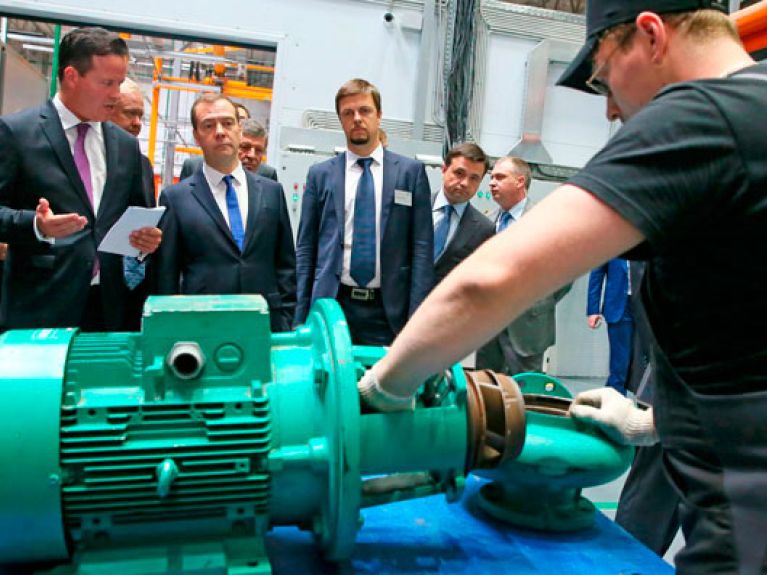Russia trusts in German expertise
The expansion of renewable energies has not yet really taken off in Russia. Nevertheless, Germany’s experience in this field is especially acknowledged.

It is considered the largest investment in Russia by a German company in 2016: Wilo, a pump manufacturer, has built a new factory for 35 million euros on a site near Moscow covering an area of eight football fields. Modern, intelligent and efficient pump technology will be produced here, announced the Dortmund-based company, which has been active in Russia since 1992. That is good news for German-Russian business relations in the field of energy efficiency. Kristina Haverkamp, Managing Director of the German Energy Agency (dena), sees this as confirmation that there is “a marked interest in German energy efficiency technologies in Russia”. People in the country recognise, for example, the experience that Germany gained in modernising the prefabricated housing estates in its new states after reunification. Another important point is the energy efficient modernisation of the process chain: from electricity and heat generation to distribution systems and buildings to consumers.
Russia only agreed a road map for energy efficient buildings in September 2016. It stipulates that the country should aim to consume 25% less energy than in 2015 by the year 2025. That sounds ambitious, but unfortunately there is currently a lack of concrete measures. There are also no nationwide incentive programmes to increase energy efficiency. Government financial instruments to promote renewable energies are also nowhere in sight. “Russia’s targeted expansion of renewable energies is not very ambitious,” states dena Managing Director Kristina Haverkamp. For example, the proportion of electricity generated by wind and solar energy, biogas and biomass is intended to increase to only a modest 2% by 2020. Russian industry, according to Haverkamp, relies on fossil fuels like oil and gas, of which it has plentiful supplies, and organises its energy supply system accordingly. “An awareness of the need to replace fossil fuels in the future does not yet exist as such,” says Haverkamp. The Russian side is only urgently seeking solutions for decentralised energy supply systems based on renewable energies in remote regions like Siberia and the Russian Far East.
Doubts and future hopes
The Konrad-Adenauer-Stiftung also comes to a similar conclusion in a study on Reducing Emissions Worldwide. It names other reasons why the expansion of renewables has not yet taken off in Russia. For example, companies eschew investments in new technologies because they believe they reduce profits. “They therefore reject laws that impose the use of emission-reducing technologies,” conclude the authors of the study. There is also a lack of interest because people in Russia do not consider it proven that climate change is the result of human activity.
However, the study also makes it clear that Germany is regarded as a suitable cooperation partner. “Germany leads in the field of environmental and energy technology and would be the best partner,” one business representative is quoted as saying. A researcher explains that Germany is a country with which Russia can collaborate very well in the climate protection field. This may also be due to the fact that many German companies in Russia place great emphasis on education. For example, Knauf Gips, a Franconian company that has also been manufacturing gypsum-based building materials in Russia since the 1990s, offers programmes of vocational training and produces teaching materials for universities and colleges on the subject of energy efficiency in buildings.

